
Newsletter Subscribe
Enter your email address below and subscribe to our newsletter

Enter your email address below and subscribe to our newsletter
Cheese dak galbi is a popular spicy stir-fried chicken in South Korea. Dak, which means chicken and galbi, indicates a cooking style that embodies sweet, smoky, and salty flavours.
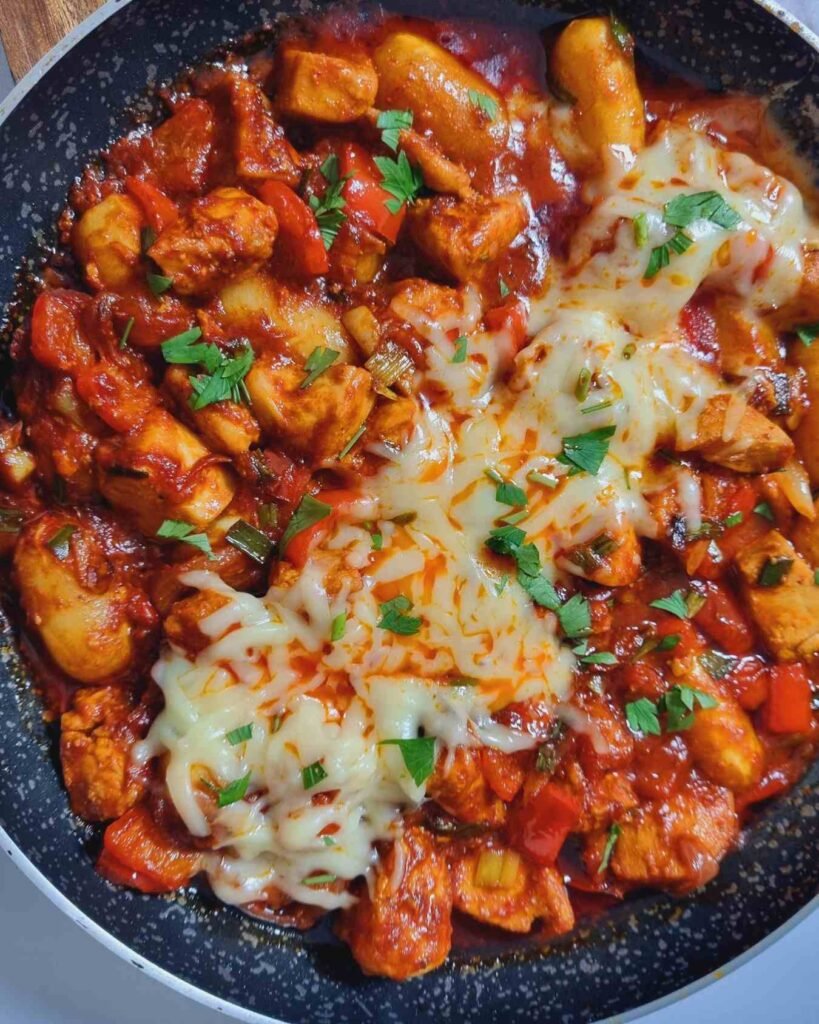
Dakgalbi is a traditional dish from Chuncheon, located in Gangwon province of South Korea. This delicious dish originated in the 1960s when a chef decided to stir-fry chicken in a spicy gochujang-based sauce with cabbage, onion, and rice cakes.
Gochuchang is known for its spiciness. Adding this hot pepper paste to vegetables such as onion and cabbage gives this dish a crunchy texture, while the rice cakes add a chewy texture. Dakgalbi was considered a sensational dish by the Korean locals, and its popularity quickly grew nationwide.
Adding cheese to dakgalbi created a fusion dish with a modern twist on the traditional dish. This extra measure added another dimension of flavour to the dish. The creamy cheese subdues the spiciness of the gochujang. Even though cheese debuted in South Korea in the 1970s, its addition to Korean foods gained traction after the 1990s.
Adding cheese to Korean foods grew in popularity due to interest from younger generations. Apart from the creamy taste of cheese, Korean children were especially fascinated by the cheese melting. Nowadays, cheese dak galbi is a beloved dish in South Korea by both locals and foreigners.
Chicken breast, Red bell pepper, onion, garlic and ginger paste, Gochujang, Dark soy sauce, sesame seed oil, gochugaru, brown sugar, salt and oyster sauce, Mozzarella cheese, Olive oil and rice cake
Chicken breast is the protein in this dish, but chicken thighs can be substituted. Red bell peppers add a pop of colour and crunch. Ginger and Garlic paste add flavour. Fresh garlic cloves and onion are chopped into small pieces, cooked, and then caramelized to add a gentle sweetness to this dish.
The marinade uses gochujang, a hot pepper paste from South Korea, and Gochugaru, hot pepper flakes from a red pepper plant. The combination of the spices creates a very gentle spiciness. Dark soy sauce and oyster sauce add an umami taste, whereas sesame seed oil makes this dish slightly nutty. Rice cakes can be purchased from most Asian supermarkets. We’ve chosen the ones with mozzarella cheese on the inside.
Wash and cut the chicken breast into bite-size chunks, about one-inch cubes. Add butter to the pan and cook the chicken for four to five minutes until lightly golden.
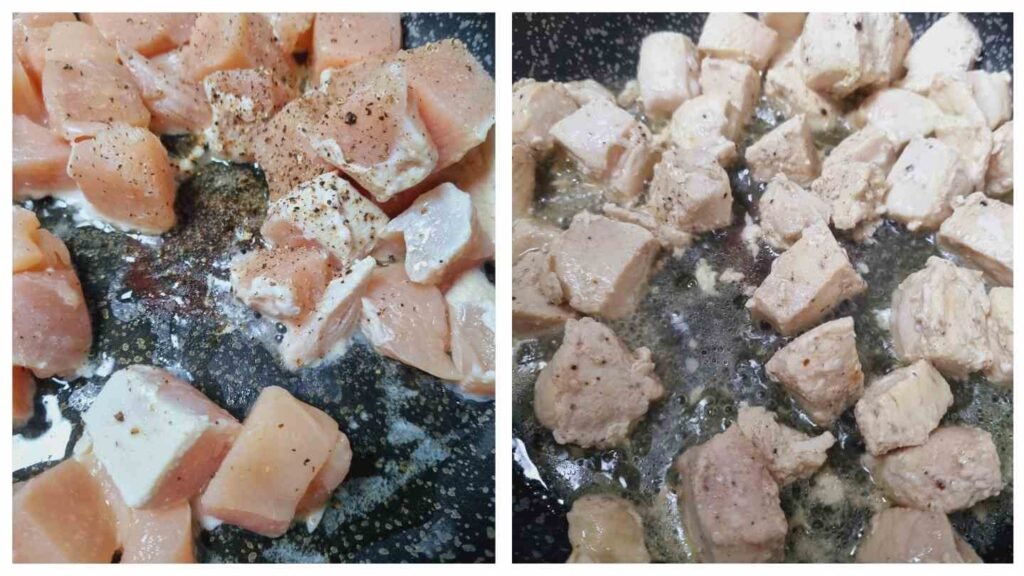
Make the marinade with the following ingredients: gochujang, ginger and garlic paste, Dark soy sauce, Oyster sauce, Brown sugar, Rice wine, Sesame seed oil, Salt, and Pepper.
Preheat the grill pan on medium-high heat, drizzle the olive oil, and add the onions. Stir-fry the onions and garlic for four minutes. Add the red bell peppers.
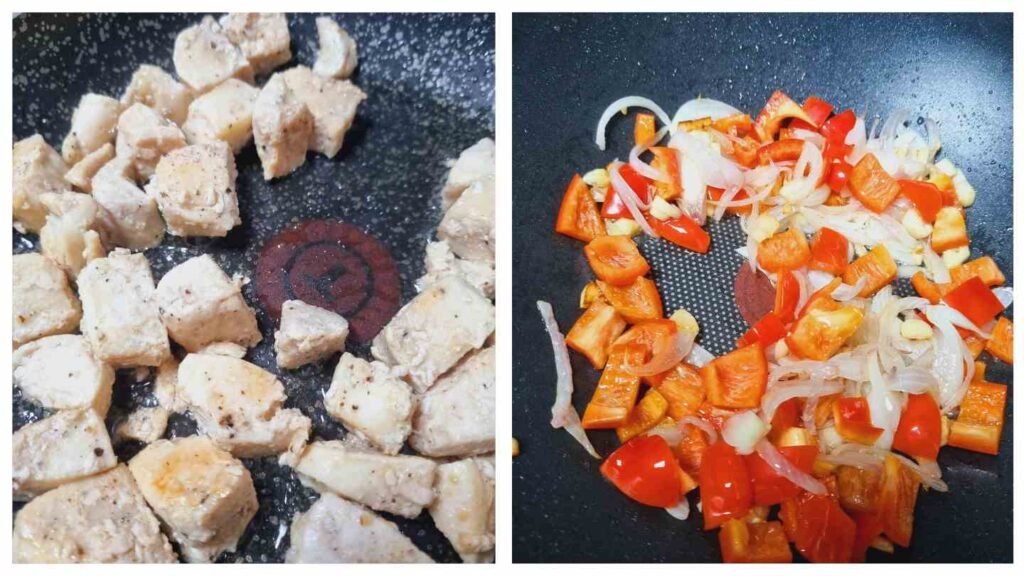
Add the green onions, stir to distribute the vegetables, and cook for three minutes evenly. Add the chicken back into the pan.

Add the chicken breasts to the pan with the marinade. Stir from the bottom up to thoroughly coat the chicken and the vegetables with the marinade sauce. After five minutes of cooking, add the rice cakes. Add seven tablespoons of water.
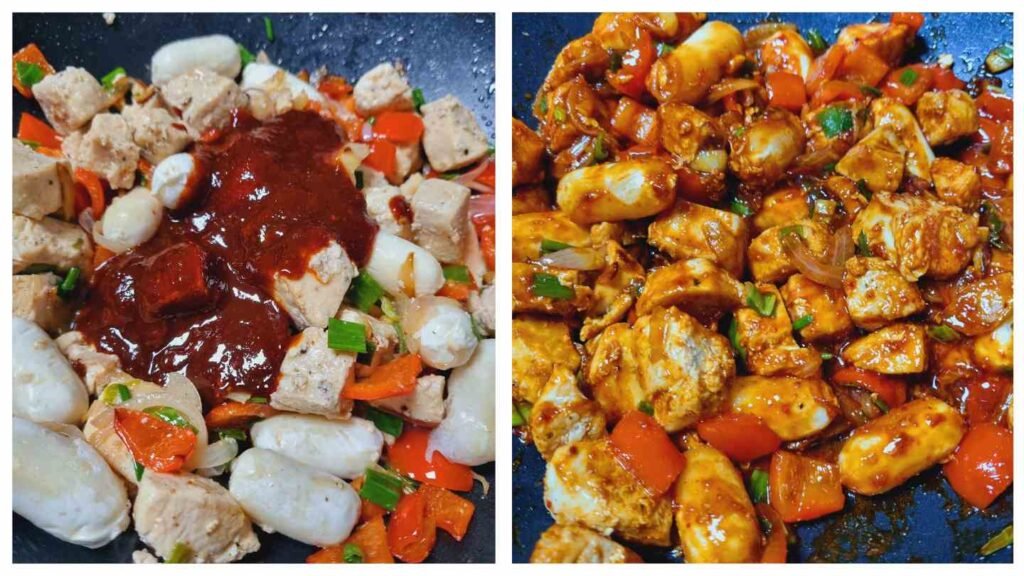
Add the tomato paste. Cover the pan with a lid and cook for five minutes. As soon as the mixture thickens up, add the grated cheese. Cover with a lid for two minutes for the cheese to melt. Garnish with spring onion or parsley, and serve.
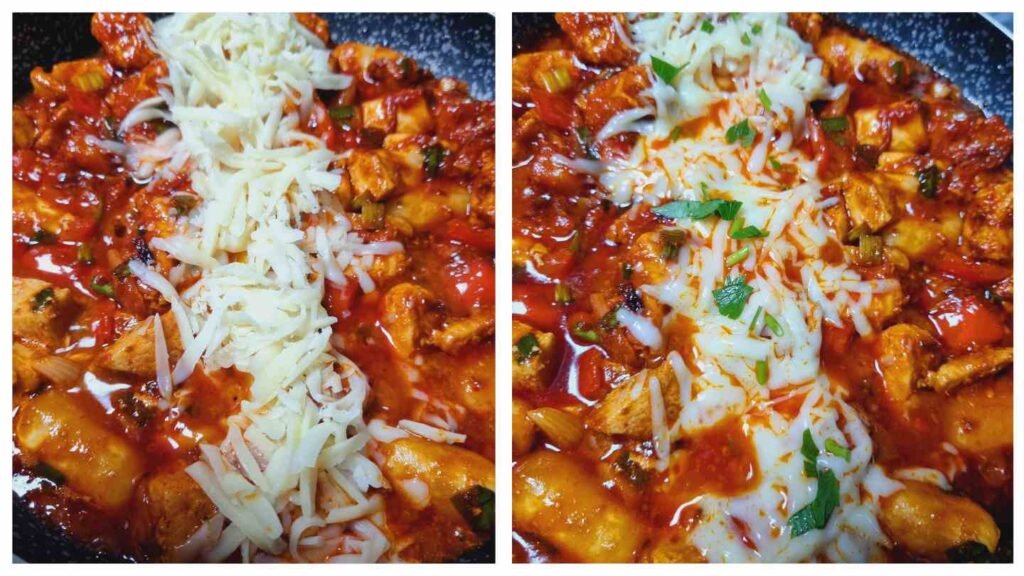
Want more heat? Adjust the amount of gochujang. Two tablespoons provide a mild spiciness, while three tablespoons pack a punch.
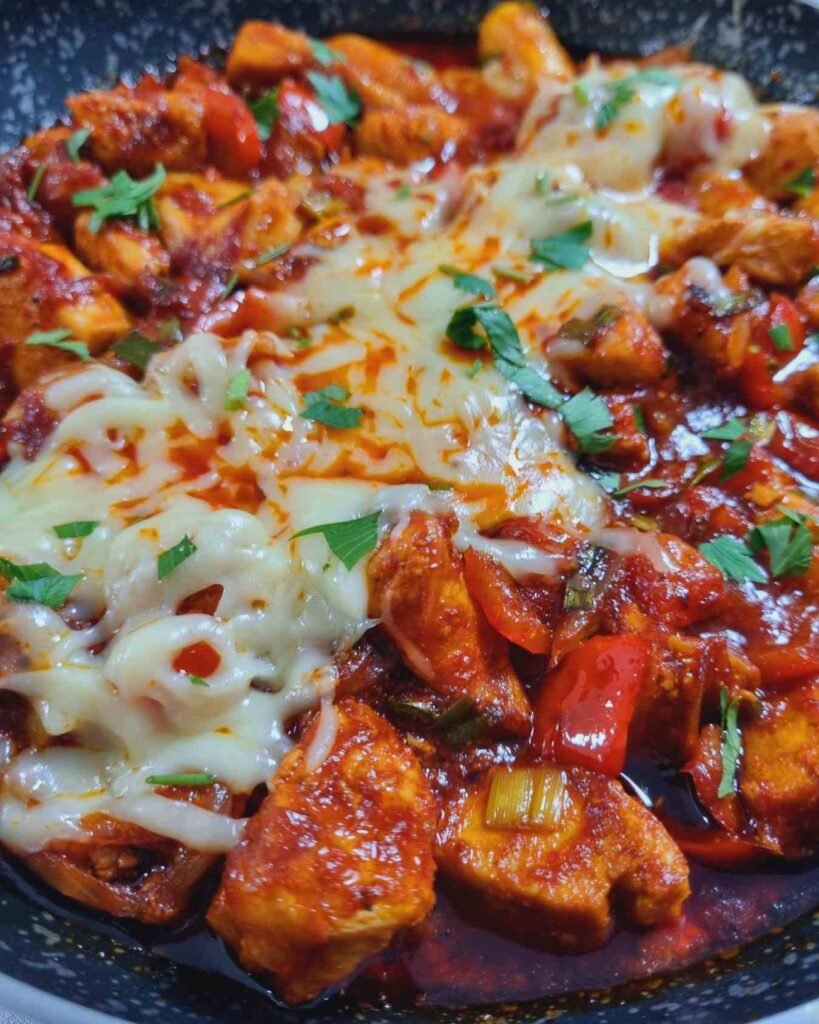
Feeling extra brave? Consider adding two tablespoons of gochugaru (Korean chili flakes). The taste of gochujang paste can be highly addictive. If you’re using a lot more gochujang, ensure you have a glass of milk nearby. 😊
Mozzarella is ideal for this recipe as it becomes stringy when melted. For a rich flavour, you can also add cheddar cheese or Gouda cheese. Use whatever vegetables you have on hand in this recipe
White Rice is the number one option. Other options include Garlic Bread or Tortillas. Cheese dakgalbi and rice are a perfectly matched pair. Side dishes like kimchi, pickled radish, or Simple green salad complement the cheese dakgalbi.
Keep the cheese dakgalbi in an airtight container in the fridge. Reheat it in the microwave or on the stove. Add extra cheese while reheating to restore the dish’s creaminess. It will last two to three days in the fridge and up to two months in the freezer. If you plan to keep the cheese dak galbi in the freezer, omit adding the cheese until you are cooking the chicken. Cheese in the freezer becomes dry and crumbly, altering the dish’s taste.
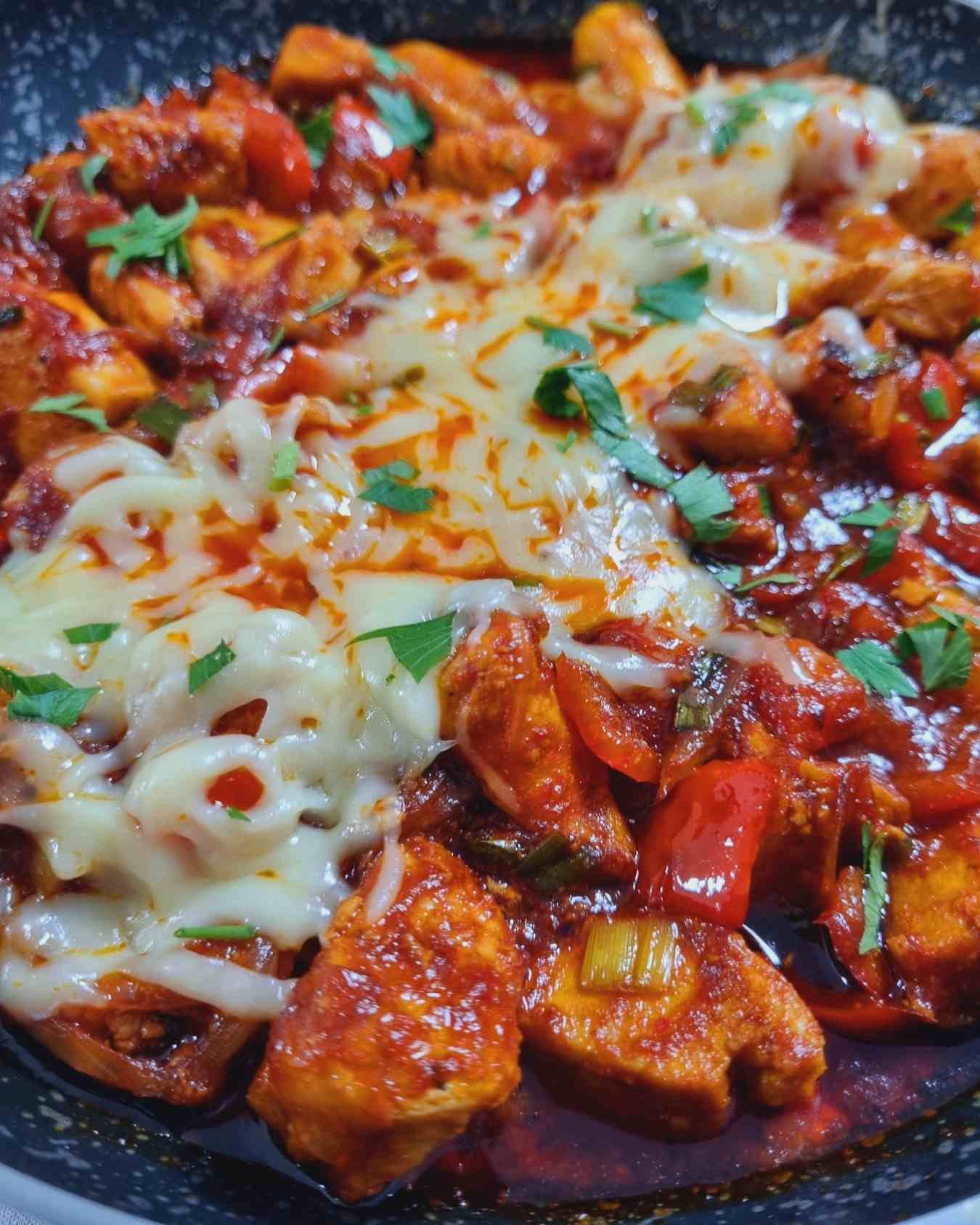
Taste just like the one I had in Korean restaurant.